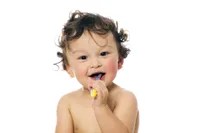So many infants and toddlers are having problems with tooth decay. What can I do now to prevent tooth decay in my newborn’s mouth?

You are enjoying the pleasure of parenting your newborn. The smiles, the cries and sucking during feeding are all wonderful. But immediately after a baby is born, parents also can start to take steps to ensure their child’s good dental health. Pediatric dental specialists recommend that parents start cleaning the baby’s mouth even before his or her teeth come in. Simply wrap a piece of gauze (a square of about two inches) around your index finger or between your thumb and forefinger. Then gently wipe the gum pads in the child’s mouth. (A soft washcloth could also be used).
The gum pads should be wiped twice each day, after breakfast and after the last meal in the evening. This will accustom the child to the cleaning process and increase the chances of the child being cavity-free as he or she grows older. As more teeth appear, you may use a small, soft-bristled toothbrush. Toothpaste does not have to be used until the child is around 2 years old. You may also incorporate the brushing with the child’s bathtime. The toothbrush should simply be placed on the tub and the child permitted to play with it. Parents can then brush the baby’s teeth at the end of the bath.
At age 3, children usually have all 20 of their primary (baby) teeth. At this time, the child should be encouraged to be actively involved in the habit of brushing his or her teeth. Until proper dexterity is developed, you should assist your child.
Early feeding patterns will also have a significant impact on your child’s dental health. If your child is bottle-fed, you should be aware that there are right and wrong ways to use a nursing bottle. Pediatric dentists suggest that the best kind of bottle to use is one that most closely resembles the human breast, which means the bottle should be fitted with nipples that make the baby work to get the milk. The key is to get the infant to exercise the muscles in his or her cheek and tongue. Also, don’t give the baby a bottle except at feeding time. If a bottle is used as a pacifier at bedtime or during the day, it can result in a mouthful of cavities caused by the sugar naturally found in fruit juice or milk. While these cavities may not be noticeable until the child reaches the age of 2, the damage can start as soon as the first teeth come into the mouth. The best way to avoid this problem is not to give your infant a bottle at bedtime. You should not allow toddlers to carry bottles around during the day either. If the bottle must serve as a pacifier, then fill it with water.
Your child’s first visit to the dentist should be pleasant, not stressful. To ensure a positive experience, your child should see the dentist as early as the age of one. Your pediatric dentist may provide early counseling on good oral habits to ensure a cavity-free experience.





















